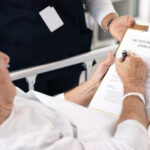Mississippi Bridge Accidents
Over 16,000 bridges are currently in the state of Mississippi, connecting people across the state and in neighboring states. While bridges are an integral part of our transportation system, they do not come with risks. The safety of bridges rests heavily on the skills of those who design and build them, as well as the agencies that are trusted with keeping them safe. Additionally, the very nature of bridge travel can increase the risk of serious accidents.
If you have been injured in a bridge accident in Mississippi, don’t wait any longer to find out if you are entitled to compensation. The personal injury team at Reeves & Mestayer is here to help you. Call us at 228-300-2754 to set up a time to talk to our team right now.
Inclement Weather Makes Bridge Travel Unsafe
Driving on a bridge in poor weather is extremely risky, but not many drivers know just how much weather changes can affect a bridge. When temperatures drop, the cold air flows above and below the bridge, causing temperatures to drop much more quickly. There is no heat trapped in the ground to keep the road warm, so the road becomes slippery and difficult to navigate much more quickly.
Add to that the fact that bridges are built with steel and concrete. Both of these materials conduct heat. Roads are made of asphalt, which does not conduct heat well. Although the bridge materials conduct heat, the road does not hold the heat, so it stays cold for much longer than the surfaces around it.
Fog is another major problem for bridge travel. Dense fog tends to be worse on bridges than on other roads, so drivers must slow down a lot in order to drive safely. Unfortunately, many drivers fail to do so, increasing the risk of an accident when a slower car appears out of the fog.
Pile-Ups Are a Serious Risk
Fog on bridges contributes to the risk of multi-car pile-ups. When fog hits, some drivers will do the right thing and slow down. When drivers who ignore the safety rules suddenly spot these drivers, it is often too late to stop and they cause a crash. The fog may prevent other cars from seeing the crash, causing them to strike it and cause further damage. With this type of chain reaction, it’s easy for a crash to accumulate 10 or more cars and cause millions of dollars in damage.
Being Pushed Over the Side is Always Possible
Perhaps one of the greatest risks of Mississippi bridge accidents is being pushed over the side of a bridge. When a sideswipe accident occurs, a car in the outside lane of travel may be forced outside its lane. This generally means falling into the ditch or onto the shoulder on a normal road. But on a bridge, this means falling onto the road below or into the water. This turns an already-serious accident into a potentially fatal one.
Bridge Collapses Are Increasingly Common
Of the more than 16,000 bridges in Mississippi, roughly 7% are currently considered structurally deficient. Over 7,300 bridges currently need repair, a task that will cost roughly $2.4 billion.
What does this mean? Not only do drivers have to worry about other drivers while navigating bridges, but they also have to worry about the bridges themselves. A bridge that has been poorly designed, constructed, or maintained may give out at any point. When this occurs, everyone on the bridge is at risk of fatal injuries and, if the bridge is above water, drowning.
Unfortunately, it’s difficult to get the repairs that bridges need in a timely manner, so the likelihood of driving on a structurally deficient bridge is fairly high. Additionally, quite a few of Mississippi’s bridges are weight restricted. Trucks or large vehicles that ignore these signs make bridges even more unsafe.
Protect Yourself After a Bridge Accident—Call Reeves & Mestayer
A bridge accident could be the fault of a driver, the designer of the bridge, or the government agency tasked with maintaining the bridge. Either way, it’s important to pursue the compensation you deserve. Schedule your free case evaluation by calling Reeves & Mestayer at 228-300-2754 or contacting us online.







